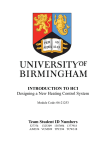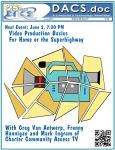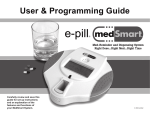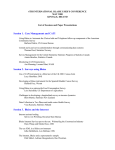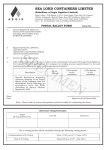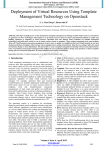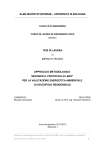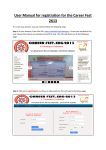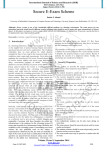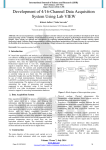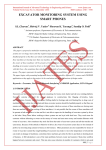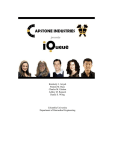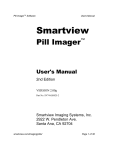Download A New Innovation in the Domain of Automatic Drug Dispensers
Transcript
International Journal of Science and Research (IJSR) ISSN (Online): 2319-7064 Index Copernicus Value (2013): 6.14 | Impact Factor (2013): 4.438 Electronic Drug Reminder: A New Innovation in the Domain of Automatic Drug Dispensers Vishal Gawde1, Ajit Panada2, Ramesh Solanki3 1, 2, 3 Department of MCA, Vivekanand Education Society Institute of Technology, Chembur, Maharashtra, India Abstract: For elderly people, there is an immediate need to design appropriate product and medication is one of the important component related to them. Management of medication is very important for acute illness and long term conditions. Helping people to manage complex medication regimes is objective of many initiatives aimed at avoiding readmission to hospital following by exacerbation and reducing probability of medication errors. In older adults, due to aging and physical & mental function decline, elderly people need to take number of drugs. In such scenario, management of complex medication is require for avoiding readmission to the hospital or before it seriously affects health of elderly. Forget to take prescribe medicine is one of the problem, so there are several products designed for solving problem, such as electronic medication reminder devices, smart phone reminder applications and many more. Due to development of smart phones in recent years, several applications were designed to solve medication reminder problem. However, it is not possible for all elderly people to make use of smart phone. Although smart phone application has more possibility of medication reminder, it should put more efforts on the technological gap, to make products more user friendly and easier to learned and used. In this paper we propose system that will help not only elderly people for medication reminder but also person who is facing same problem. Propose system is combination of automatic pill dispenser and smart phone application which will help user to manage complex medication regimes. Keywords: Medication regimes, Electronic medication reminders, Pill dispensers etc 1. Introduction Population ageing is profound, having major consequences and implications for all facets of human life [1]. Medication reminder problem most frequently occurs with elderly age group. If elderly people can take care of health in daily life, it will reduce care burden among young generation; if we improve medical compliance, it will help senior citizens and other patients who are facing the problem of medication reminder to live life independently. It is also found that chronic diseases are frequently occurred during ageing process, there are more than 50% of older people suffered from different diseases across world. Older people need to take multiple drugs due to physical and mental function decline. Doctors prescribe medicine to patients and also suggest which medicine to take at what time. In case of older people, they not able to memorize which medicine to take at what time. Same cases found with users who unable to read and understand doctor’s prescription. However due to aging or busy life, patient sometime forget to take medicine which would led to readmission to hospital following by exacerbation. It not only affects the disease, but also seriously endangers patient’s health and security. Many reports indicate that adherence with prescription among elderly patients with chronic condition is poor. The range of medication adherence rates seen in elderly is 26% to 59% [2]. Studies have demonstrated the prevalence of poor adherence across all types of regimens and diseases, including life threatening illness; for this reason, often caused by medication non-compliance with more discussion and concern. Improvement in the field of medical compliance will helps to increase cost-effectiveness. In recent years with development in electronic communication systems and products, some devices and software’s were developed for medication reminder. Some of software not only notifies user about medication but also connect to comprehensive medication database, or provides list of Paper ID: SUB155810 physician with their clinic address. However previous research works targeted on younger adults with computer of smart phone usage, however different variables vary to according to age group of users. Universal design refers to broad spectrum ideas meant to product buildings, product and environments that are inherently accessible to older people, people with disabilities and people with disabilities [3]. However not all people can make use of mobile phone for medication reminders. Our system electronic drug dispenser aims for patients that has one or more chronic diseases, may have been hospitalized already for missed or over dosage of medication. Electronic drug reminder includes container and removable cap attached to container. Components of electronic drug reminder include a counter, a real time clock, a dispensing mechanism, a sensor, a visual led indicator, input/output interface, power source, pill dispenser circuitry also include a locking mechanism, a transceiver, an antennae and physical indicator for alarms. Electronic drug reminder notifies user about their dosage through alarm. Users or caregivers have to set patients dosage time. System will notify patient’s relative or caregiver though email/sms or making call in case patient miss dose. If any pill is going to out of stock, it will automatically notify caregiver by sending details about it. Propose system can be configuring through on device touch panel or using smart phone application. By using smart phone application, user can save critical information about pills such as manufacture firm, expiration date etc either by bar code scanning application or by manually inserting fields which is absent in many drug dispensers. This will help not only senior but also patients have cognitive impairment. 2. Current System In recent years with development in electronic communication systems, many devices and software Volume 4 Issue 6, June 2015 www.ijsr.net Licensed Under Creative Commons Attribution CC BY 2268 International Journal of Science and Research (IJSR) ISSN (Online): 2319-7064 Index Copernicus Value (2013): 6.14 | Impact Factor (2013): 4.438 applications are available that helps in complicated drug management. Out of them, most convenient ones are alarm watches and automatic medication dispensers. Alarm watches with audible or vibrating alarms reminds someone to go their daily/weekly/monthly pillbox and take appropriate medication on time. With alarm watches, user can set to alarm several times a day, so odd medication schedules can easily be accommodated. These watches are complex to program, and seniors can easily frustrated by instructions that are not clear. Other option available to complex medication reminder problem is automatic medicine dispenser. to expel the dosage. Dispensing method is also not safe in case if there are children present since it is accessible to anyone, but it also provides the opportunity for the pills to fall on the grounds easily. Patient on wheelchair unable to pick up pills if it fell on the grounds as well as those with poor vision. All information for electronic medication dispenser is available but it is not comprehensive for all users especially the elder ones. Figure 1: E-pill MedSmart Locked dispenser [6] Automatic medical dispenser such as e-pill MedSmart as shown in Figure 1 has abilities to alert caregiver if medicines have been missed [5]. E-pill MedSmart is automatic monitored locked e-pill medication dispenser device dispense up to 6 times per day. The e-pill MedSmart has been developed to give the patient’s caregiver peace of mind knowing that right medication are taken by patient on right time [8]. When the alarm goes off, this e-pill dispenser reminds patients to take their dose by long duration alarm. Alarm will ring for 30 minutes, if a patient does not take medicine or misses dosage, system will automatically notifies caregiver. It has feature of remotely notifying caregiver by sending message, email or phone call when patient misses dosage. Current system can alerts caregiver about drug refilling by sending message, or email. E-pill MedSmart is lockable pill dispenser keeps medication safe. It has rotating disk that contains several compartments in which pills are separated in order to create appropriate dosage. When alarm goes off, the disk in device rotates to reveal next dosage to be taken. Patient turns device upside down so that pills falls into his/her hands. Main advantage of e-pill MedSmart is portability, so it can be taken with user at all times. Negative point about this product is loading of pills is time consuming. To load pills into device, all the dosages must be pre-separated which requires effort of caretaker in most of the cases. Device dispensing mechanism is also inadequate for many elderly, since it requires one to tip the device over Paper ID: SUB155810 Figure 2: MD2 pill dispenser [9] MD2 dispensing device is sophisticated medication dispensing device than E-pill MedSmart. This product have same feature of a timed dispensing mechanism with an alarm system to alert user about medication. Dosage is expelled in a small plastic container once button is pressed by the user which will turns off the alarm. If a dosage is missed, the device can call up to four individuals to alert them that a dose was not taken. The advantages of this device is that it alerts another individual of a missed dose rather than moving onto the next one, so the probability of a dosage not being taken is relatively small. Opening pill loading container once dispensed may also prove difficult for some individuals with limited mobility and poor vision. Disadvantage of current system: 1) Difficulty in loading of drugs. 2) No pill cutting strategy is available. 3) Gel type capsules stick inside chambers. 4) Power backup during power outage. 5) Difficulty in finding expiry dates for medication. 6) Low battery/charging notification 7) No volume control for alarm. 8) No support for local language. 9) No support for report generation. Volume 4 Issue 6, June 2015 www.ijsr.net Licensed Under Creative Commons Attribution CC BY 2269 International Journal of Science and Research (IJSR) ISSN (Online): 2319-7064 Index Copernicus Value (2013): 6.14 | Impact Factor (2013): 4.438 Figure 3: Features of Electronic Drug reminder button for touch panel is at the back of the device to prevent pressing of button from any individual including children. 3. Proposed System Rough model of propose system is based on latest technology which makes use of smart phone and automatic medicine dispenser. Each technology has its own advantages. In this propose system we attempt to integrate its feature to make life of user more comfortable. Propose system alerts patients about its dosages through their mobile phones first. If patient miss the dose as set in system, system will send signal to patient’s mobile phone. Mobile will alert patient either by vibration or using alarm. If patient doesn’t respond to dispenser within 10 minutes, on device alarm will be set on so that it will notify person around patient and patient too. If within next 20 minutes, patient doesn’t respond, system will track down information about missed dosage and sends email/text message to caregiver. Caregiver smart phone application will make use of information related to miss dosage to create detail report. On device application can predict about when dosage will be emptied and remind about patients next doctor visit. As notice in existing system, there is no way to control volume of alert sound. Default sound setting too loud which can irritate not only users but also others at the house. Existing dispenser is very good at reminding medication, but when patient removes pills from machine there are chances that patient does not take the pills, he may leave them in dispensing counter after turning off the alarm, goes off to do something else and then forget to take pills. The real problem comes when next alert comes in same day, dispenser will dispense medicine in tray, so now in dispensing counter there will be two time dosages will be there. One is earlier missed one and current dosage which may lead into over dosage of medication. In propose system of electronic drug reminder takes care of issues mention above. Propose system uses rechargeable battery pack. In case if unit shows bad/low battery then device will notify caregiver about charging. Touch panel will show status of the battery in ‘%’ when plugged into A/C power. Power Paper ID: SUB155810 A. Abstract View of proposed system Figure 4: Abstract View of proposed system Patient’s relative or caregiver can easily set schedules for drug. Caregiver can make use of touch panel to set alarm time and pills related setting. System will alarm as per medicine time set into device. Patient gets notified and will press button on device. System will stop alarm and dispense pills as per schedule. Patient can collect pills from pills collector which collects pills dispense by device. The dosage is expelled in small paper bag once button is pressed. When a dosage is release, any medication instructions that was programmed into the device with help of application is then given orally, such as ‘take the food’. The smart phone Volume 4 Issue 6, June 2015 www.ijsr.net Licensed Under Creative Commons Attribution CC BY 2270 International Journal of Science and Research (IJSR) ISSN (Online): 2319-7064 Index Copernicus Value (2013): 6.14 | Impact Factor (2013): 4.438 application for electronic drug dispenser also has local language support for better usability. Small sensor above pills collector to make sure pills are taken by patients. In case if patient pushes the button after device alarm, but did not take pills from collector the device again notifies user through voice instruction. There is led indicator around push button provided to get patient’s attention. On device only one button is provided in order to prevent user from confusion. Door lock is at back side of device with proper locking mechanism. Device has transceiver, antennae in order to contact caregiver in case of emergency and miss dosages. B. Electronic Drug Reminder mechanism children. However compartment structure is fixed which makes device non-scalable. However different versions of electronic drug reminder will have different number of pill loader compartment as per patient’s age group. The processor and memory will be configuring in the form of microcontroller, firmware, control logic or other pill dispensing circuitry. Instructions and data are store into the memory for processing information and include embedded pill dispensing firmware. The processor will be connected to all other component of electronic drug reminder and controls the movement and process instruction as well as data in the dispenser. The memory and processor can be programmed internally by input/output interfaces or externally wirelessly using smart phone device. Timing mechanism will be serving by real time clock to provide timing related function corresponding to particular occurrences associate with sensors. Figure 5: Abstract internal pill loader structure Operation related to electronic drug reminder starts with loading of pills configured for use with a particular pill X. Dispensing container divided into 8 compartments by plastic or any other suitable material. Each individual compartment in dispensing unit may have its own individualized time schedule with same dispensing mechanism that accesses pills from each compartment. Once counter goes off appropriate pills from each compartment is being dispense by device. Caregiver can put pills of type 1 in compartment 1, type 2 pills in compartment 2 and so on. In automatic pill dispenser such as E-pill MedSmart, caregiver has to make dosages of different pill, and put it into compartments. Small sensor inside device checks regular status of number of pills in each compartment and signals to device communication unit in order to notify caregiver before pills gets emptied. This will help electronic drug reminder to track number of pills that are in container and have been dispensed. Sensors may be movement or motion sensor, proximity sensor etc. Additional sensors may be inside electronic pill dispenser to detect whether power level is below the threshold level, and sensor to detect whether cap to compartment is properly fitted. In case if there is any problem in dispensing unit, sensor will signals to communication unit in order to notify caregiver about it. Caregiver should put all pills of type A of compartment 1, pill type B in compartment 2 and so on. If caregiver puts different pills in one compartment, system will detect it, notifies it about it. Each compartment is independent of each other, but can be synchronized to dispense pills at the same time as per prescription. Electronic Drug reminder device is locked automatic device same as MD2 in order to protect it from other individuals such as Paper ID: SUB155810 Figure 6: Loading of drugs using application In recent years the technology and science for the development and use of smart phone have progressed tremendously. In spite of the Smartphone have several negative points in the domain of medication reminder such as it cannot carry medicine and economic variation. But it has variety of interface which makes good reading experience and integration of various functions. As shown in Figure 5, user can load pills in different compartment and configuration done with help of smart phone application. This application will run on major smart phone operating system such as android, iOS. Design of the application is simple for better usability and for easy access. Initially applications have to register with electronic drug reminder device. Each electronic drug reminder device has 8 digit or any fix number digit as device id which will be printed at the back of the device. User have to register their smart phone application with propose device which is being purchased. Once registration process is over that user can set or configure drug related setting for patient. Most of the pill dispensers have problem of loading dosages in dispensers. In this propose system, user or caregiver has to open dispensing container by unlocking it which is at backside of the device. This unit is box shape and its abstract view is shown in Figure 5. Once user opens it, next thing is selecting Volume 4 Issue 6, June 2015 www.ijsr.net Licensed Under Creative Commons Attribution CC BY 2271 International Journal of Science and Research (IJSR) ISSN (Online): 2319-7064 Index Copernicus Value (2013): 6.14 | Impact Factor (2013): 4.438 compartment to load specific pill, such as pill X. In Figure 6, Graphical user interface for compartment selection is shown. Green color indicates that compartment already filled with some pills, where blue color simply indicates compartment is available. In case if caregiver or user selects compartment which is preoccupied, application should notify user about it. In case any help is required, help options are also provided. Information related to how to load pills can be shown to new user through video. Each compartment in propose system labeled from C1 to C8 which helps user to understand it more clearly. Local language support will be available for application. Once user selects compartment, application will ask setting related to it such as schedule time, drug name etc. Figure 7: Alarm time setting using application Figure 7 shows drug reminder setting application interface. Once user select compartment, next step is configuration of setting for that compartment. Settings include name of the drug, manufacturing firm, expiration date, number of days etc. As shown in the Figure 7, user is performing setting related to compartment C1. For example, if user wants to load pill type X, Y, Z into dispensing container compartment C1, C4, C6 respectively, and then user have to select C1 in application as shown in earlier figure. On next screen application will ask user to input information related to drug/pill such as name, alarm time etc. Nowadays it is possible for smart phone application to read barcode on the product, Application also have feature of barcode reading which will minimize user manual data entry. In case if users smart phone unable to read information through barcode, user can enter details manually. Setting an alarm time for dosage is simple through application. Interface of the application is easy to understand and similar to the alarm setting found in smart phone for ease of use. Application has option for volume control for device which were absent in earlier systems. Current system such as MD2, notifies user by making sound. In propose system option is available to user whether device notifies user or user’s mobile phone or both. In case if patient is out of the house, same time automatic dispenser such as MD2 will alarm, however if Paper ID: SUB155810 patient is not at home then there are chances of missed dosage. By considering this case, propose system can notify actual patient through mobile or on device alarm system depending upon user choice. Caregiver or user schedule drug dosage as prescribe by doctor through application. User can also save information related to allergies into application which will help doctors to prescribe medicine. Electronic drug reminder settings can be remotely configured with help of application. Application provide interface which helps user to store each and every information related to patient and drugs prescribe to it as shown in previous Figure 6 & 7. Application can collect all information about drug on single click on button. In Emergency contact list, user can add maximum six contacts which will be use in case of emergency which is same feature as MD2. Application can generate report weekly/monthly as per user choice. This report will help doctor to see patient’s health condition progress. Caregiver can also install application to patients mobile and have to set application mode to patient, so on next dosage patient phone will work as reminder. Same application interface is also available on device touch panel. Electronic drug reminder also sends signal to either patient or caregiver mobile phone application before it’s charging goes discharge completely. Caregiver can also set instruction for patient such as what liquid food should take before or after drug dose. Some of the medication reminder software has abilility to connect to a comprehensive medication database. In propose system application software can also connect to medication databases in order to acquire medication identification photos which help to attract elderly for the use of smart phone application. Several automatic monitored dispensers have to connect to phone line in order to call and notify caregiver however making use of SIM card based technology in pill dispensers will make them more powerful and portable. 4. Conclusion This propose system is beneficial for: Patients who has one or more chronic disease. Patients who needs to take multiple medications or have complex medical regimens. Patients may have been hospitalizing already for missed and over dose medication. Patients have cognitive impairment. Main advantage of propose system is remote configuration of electronic drug reminder through mobile application and portability of device. It helps to notify caregiver about expiration of pills, refilling of the pills and battery status. It not only dispenses pills as per schedule time but also confirms that user has taken it from pill collection tray. With the help of medication database connect to application, help users to access information about it such as medication identification photos, on which disease it works perfectly etc. Reporting of miss dosages will help doctors to see progress in patient’s health. However disadvantage of system is no pill cutting strategy is being implemented and non-scalability. However different versions of electronic drug reminder will have different number of pill loader compartment as per patient’s need. Volume 4 Issue 6, June 2015 www.ijsr.net Licensed Under Creative Commons Attribution CC BY 2272 International Journal of Science and Research (IJSR) ISSN (Online): 2319-7064 Index Copernicus Value (2013): 6.14 | Impact Factor (2013): 4.438 References [1] World Population Ageing: 1950-2050, United Nations Population Division. [2] van Eijken M, Tsang S, Wensing M, et al. Interventions to improve medication compliance in older patients living in the community: a systematic review of the literature. Drugs Aging. 2003;20:229-240 [3] http://en.wikipedia.org/wiki/Universal_design [4] http://eldercareteam.com/public/511print.cfm [5] http://www.assistedlivingct.com/blog/2014/02/23/technolo gy-helps-the-disabled-safely-manage-their-medications/ [6] http://www.epill.com/medsmartplusqa.html [7] https://www.google.com/patents/US7359765 [8] http://www.amazon.com/Pill-pill-MD2-PLUSInstitutional/productreviews/B00020BKA2/ref=cm_cr_dp_see_all_btm?ie=UT F8&showViewpoints=1&sortBy=bySubmissionDateDesce nding [9] http://pedroleiteantunes.hubpages.com/hub/Automatic_Pill _Dispenser [10] http://www.mthommed.com/products-services/medicationmanagement/ Author Profile Vishal Gawde is in his final year of pursuing MCA from Vivekananda Education Society Institute of Technology, Mumbai. He completed his graduation in Bachelor of Science (Information Technology) and his research interest is mobile technologies and healthcare sector Paper ID: SUB155810 Volume 4 Issue 6, June 2015 www.ijsr.net Licensed Under Creative Commons Attribution CC BY 2273






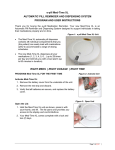
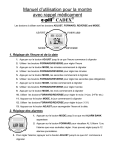
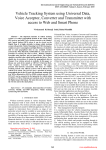
![complete information [English]](http://vs1.manualzilla.com/store/data/005803910_1-e6b0f51b61ee7060f2602055e87ee74e-150x150.png)
